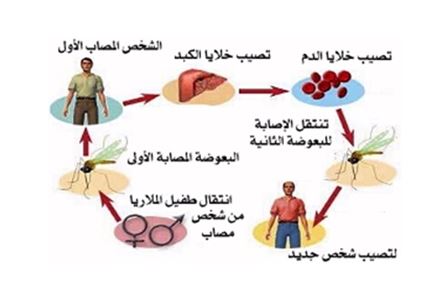Overview:
Malaria is a mosquito-borne disease caused by a parasitic organism called plasmodium. This parasite invades red blood cells in the human body and destroys them.
Incubation period:
The incubation period of the disease ranges from 7 to 30 days.
How do mosquitoes transmit malaria?
Malaria is transmitted to humans most commonly through bites of infected Anopheles mosquitoes, called ‘malaria vectors’, which bite mainly between dusk and dawn.

Other modes of malaria transmission:
Other than mosquito bites, people can also catch malaria from exposure to infected blood, such as in the following cases:
- An infected mother may transmit the disease to her unborn child.
- By getting blood transfusions from an infected person.
- By sharing needles with an infected person.
Symptoms:
Malaria signs and symptoms typically begin within a few weeks to a month after being bitten by an infected mosquito. The disease is generally characterized by recurrent episodes of the following symptoms:
- Fever and chills
- Excessive sweating
- Headache
- Nausea and vomiting
- Diarrhea
Diagnosis:
- Early diagnosis and treatment services help reduce the severity of the disease and prevent malaria-related deaths. It also lowers malaria transmission rates.
- WHO recommends prompt parasitological confirmation of diagnosis either by microscopy or malaria rapid diagnostic test (RDT) in all patients with suspected malaria before treatment is administered.
- The results of that test can be available within 15 minutes or less.
- Treatment for malaria should not be initiated based on the symptoms alone if diagnostic tests cannot be conducted to confirm the presence of a parasite.
Treatment:
Worldwide, malaria is treated with a range of medications depending on the type of malaria parasite you have and the location where the disease was contracted; as some of these parasites have developed resistance to certain medications and they can no longer be used.
Malaria medications:
- Chloroquine
- Quinine sulfate
- Hydroxychloroquine
- Mefloquine
- Atovaquone + proguanil
Prevention of malaria:
- Mosquito control.
- Take all possible measures to protect yourself from mosquito bites, such as wearing long-sleeved clothes, covering the legs in places infested with insects, and applying insect repellents to the skin and clothing.
- Make sure to place mesh nets with tiny holes on all windows and doors to prevent insects from coming in.
- Use a mosquito net if you are planning to sleep outside.
- Avoid travelling to areas where malaria is common as much as possible.
- If you can't avoid traveling to malaria-endemic countries or regions, then you should make sure to take preventive medications to protect yourself from the disease. A dosage should be prescribed one or two weeks before your trip , during your stay, and for four weeks after you return.
- Filling ponds or swamps and removing mosquito breeding sites helps prevent and reduce malaria transmission.
Complications:
In most cases, malaria patients develop one or more of the following complications:
- Pulmonary edema, which is fluid accumulation in the lungs that can make it difficult to breathe;
- Liver or kidney failure or a ruptured spleen;
- Anemia;
- Swelling in the brain or brain cell damage, and cerebral malaria can result in a coma.